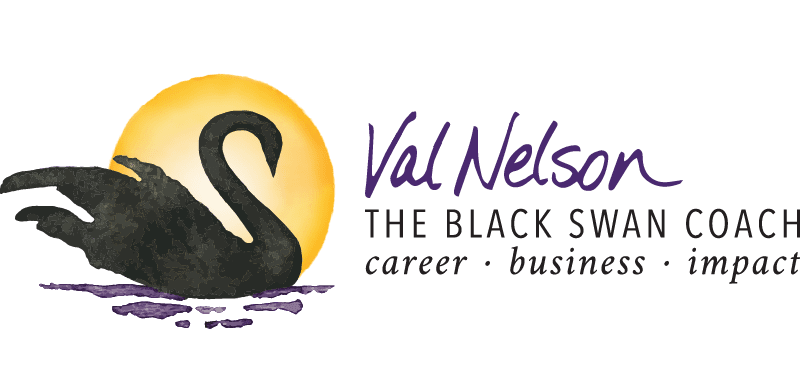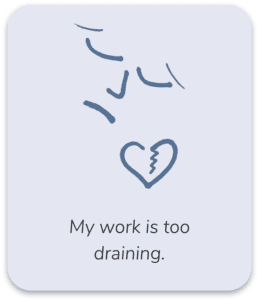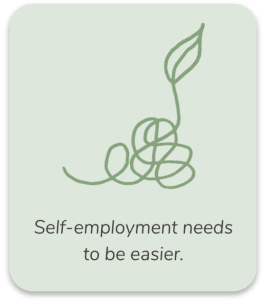When consultants, coaches, and other service professionals are getting set up for self-employment, they often worry about all the business setup logistics they think they need to know.
Business setup stuff felt like a big mystery to me, at first, as if behind the curtain in the Wizard of Oz.

Maybe you’re even worried you’ll get in trouble for something you didn’t know. Let’s pull back the curtain right here and now. I’ll share some basics for business setup, as well as what I have done as a self-employed coach.
Disclaimer:
I am not a lawyer or tax accountant. None of this should be taken as legal advice or as what is the right thing for every case. Please consult the appropriate professional for your particular case. There are different ways to go about these steps. This outline just gives you an idea of where to look, from one solopreneur to another.
Don’t let business logistics worries stop you.
I’ve seen many people let worries about these things really get in their way, thinking it’s something huge to tackle. They think they can’t do anything else before getting a business name, some kind of incorporated entity (e.g., LLC), etc.
I’m a self-employed business coach and I had to learn this stuff too, 11 years ago. Even though I understood a lot about marketing and business, the business setup stuff was new to me, having been an employee until then.
It turns out it’s not that huge, especially for solo service providers like us. Important, yes, and sometimes tedious, yes. But much of it can be easier and is often not as urgent as you might think. In my case, I did it over time.
There are plenty of things you’ve done that are harder than this. Don’t let business logistic worries stop you from going for your dreams.
When To Focus on Business Setup Stuff
It’s time to think about formal setup steps especially in these situations:
- Before you see clients at your location in person.
- Before you see clients for things like health care or hands-on work.
For others, there is often more flexibility:
Usually, for solo professionals (like coaches, consultants, trainers) who work from home, you don’t need to set up everything immediately, and not all of the setup logistics are needed for solo professionals like us.
If working from home, here are some signs that it’s time to think about formal setup:
- You start spending and earning enough to know this is a real thing.
- At least once you’ve been earning money for a couple months and it’s time to track things and potentially pay taxes.
- At the very least, before tax time.
Experiment first before putting too much in writing.
You want to understand your business focus, and feel confident about it, before you choose names, branding, pricing, software, etc.
For instance, get some practice clients before going too far down one road. (I’ve talked about how to do that, later in this post.)
If seeing people in person, such as in healing arts, ask others in the field about how to explore things up close or shadow someone before choosing that path.
I recommend holding off on business names and websites at first. Too many people think they have to do that before getting clients. That can be a distraction from just getting your first client.
Once you begin with clients, so much is revealed about what feels right to you and them. THEN you’ll know more about the business you want to build.
Business Setup Logistics To Do or Consider

It’s time to open that door and see what’s inside.
Let’s look at the logistics.
Here are some ideas of what self-employed services professionals need to learn about, in the USA.
Higher priorities:
- Get a business accountant and set up your books.
Find an accountant who is a good teacher for new business owners. They can help you:- Set up income and expense tracking, and know what to track or not.
- Understand how to pay taxes as you go (e.g., quarterly tax payments).
- Understand your numbers and what’s working or not, or where you might need to change pricing and spending.
- Consider the legal entity that’s right for you (e.g., sole proprietor, LLC, etc.)
- Get a tax accountant.
Your business accountant might also do taxes, but sometimes these are different people and they can refer to each other. Well worth the small expense. - Home office considerations.
Ask your accountant whether and how you can take your home office as an expense. If so, you’ll also need to track some expenses around that. - Separate your personal and business financial accounts.
Set up separate accounts for your business, so that income and expenses are not mixed in with personal. This includes a separate bank account and a separate online payment account such as Paypal.
OK, this kicks up the business name issue. Talk to the bank about using your name for now and options to change the name later. Naming concerns shouldn’t stop you. - Consider business liability insurance.
Some situations are a higher risk than others, like health related businesses. I recommend you ask others in the same field what they do and what they use. If you see clients at your location, your landlord will most likely require it. - Health insurance.
- There are income-based health insurance options through the US government here.
- Or find a business insurance agent who can find you the right match.
- Or ask colleagues or a business organization such as the Chamber for recommendations. There might be group options you could join.
- Health insurance might be used as a business expense. Ask your tax accountant.
- Talk to a free business counselor.
In the USA, there is free business counseling available in each state. Find your local business counselor services here. They can help you know the logistics relevant to you.
Beware that these free business counselors are mostly familiar with businesses with employees, business loans, etc., but they can still be helpful if you remind them of your smaller type of business. - Set up how to get paid.
Besides accepting checks, I encourage you to also accept credit cards and online payments too. I have a small section about that below. - Client agreements.
I think it’s important to have clear written communication about what will happen. A signed agreement is the typical way to do that, whether digitally signed or by hand. Open communication is just a nice thing for everyone. You can ask someone in your same field for guidance or samples. I would seek legal review for any new or special contracts. (Some people use templates from Nolo.)
Lower Priority Logistics for Home-based Service Professionals, but Still Worth a Look:
- Business name?
For solo service professionals, it’s common to simply use your personal name.
If you want a separate business name, at least wait until you’re clear on your business niche, and use your own name in the meantime. - A business plan?
A simple business plan is firstly for you, to clarify your goals and the path to get there.
A formal business plan can be used to seek outside funding.
For solo service professionals, a 1-page summary sheet is usually enough information for you, and you want to keep it fresh. A business coach can help.
For formal business plans, ask your business counselor for a template. A business accountant can help. - Register your business?
If you are home-based and using just your name as your business name, you might not need to do this. If you have a business location and/or a business name, talk to your free business counselor for guidance on what to do in your area. This is a local municipality issue. - Register as a particular legal entity like an LLC?
Ask your tax accountant or business counselor for guidance. In some states, registering as an LLC or other entity is a considerable expense, annually. But there are benefits to consider. - Business lawyer?
You might want to know of a business lawyer to call on, for things like LLC questions, consulting agreements, trademarks, or questions that might arise. A business counselor can suggest when to call on one. A local law school might have free options. - “Self-employment tax”?
When you have an employer, they pay taxes into the Social Security system for you. Now it’s up to you as the owner to pay into it for yourself. It’s paid when you file taxes so you don’t need to think about it until then. This is just to answer a common confusion.
Some people call this “self-employment tax.” It just means you’re paying into a federal pension system (Social Security) that will pay you later, in retirement or if disabled. It’s a reason not to hide any income, because that amount will affect your future pension income as long as you live.
Also, when COVID hit, some self-employed people whose businesses lost income were eligible for unemployment insurance based on past income filings. Those who hid income did not get as much or any. - Disability insurance?
Employers sometimes provide disability insurance and/or paid sick time. Getting disability insurance for yourself is not a small expense but could be worth a look. The value of it depends on your personal financial situation and responsibilities. It usually fills a gap before Social Security Disability Income (SSDI) would kick in.
What I’ve Done in My Case for Business Setup
It looks like a long list, but this happened over years!
 Business accountant.
Business accountant.
Originally I hired a bookkeeper to help me set up my books. Later I hired a business accountant to help me understand more and choose among various systems. Each time it was definitely worth it in time and money, and it wasn’t that much. I do my own day-to-day bookkeeping. It’s easy now that the software is set up and I’ve learned how to use it.- Tax accountant.
I always pay a tax accountant to do my taxes and it’s a great use of money. And not as much as I would have expected. - Home office.
I have continually maintained a home office that I use as a business expense when filing taxes, even when I also had a part-time office for seeing clients in person. My tax accountant has helped me follow the law and track what’s needed. - Separate financial accounts.
I have separate accounts for my business, including a separate credit card. It makes accounting and reconciling so easy. - Business liability insurance.
I have business liability insurance through a company with a special package for coaches. It was recommended to me by other coaches. - Health insurance.
When I first began, I used income-based health insurance through the state and it was a blessing. Then when I earned too much to qualify, I got a business insurance agent to help me set up my own health insurance plan as a self-employed person. Big expense, yes, but it’s a business expense that reduces taxes. Now my spouse’s employer provides coverage for both of us. - Free business counselor.
I have at times met with the free business counselors at the Small Business Development Center near me, to understand some business setup basics. And I’ve attended their business workshops. They have also sent me referrals. - Payment systems.
At first, to keep things simple, people paid me by check. I soon learned how simple it was to also allow payments with apps like Square and Paypal, so I started that.
Later I added a shopping cart on my client portal to streamline things even further. - Client agreements.
I use an agreement that is visible before someone pays, in my shopping cart system. I have had professional help over the years to develop and refine those agreements, starting with asking other coaches for templates. When I was offered a paid advice column writing contract, I had a lawyer review and request revisions before I signed. - Business name.
I personally found no need for a business name — I just use my name. Early on I registered a business name with the city, but then decided not to bother with it and I let it go. It also saves the hassle of annual fees to the city. - A business plan.
I have never sought a business loan or investor so I have never created a formal business plan like they require. But I like having a 1-page business plan for myself to show me how it all adds up to meet my income needs. It has been so calming to get clear on the math and to see my goals visually on one page. - Register your business?
I did that with the city when I had a business name and location outside my home, but I don’t anymore and my city told me not to bother in that case. - Register as a legal entity like an LLC?
Years ago, someone at a business law clinic advised me that, in my case, liability insurance provided more protection than the LLC, for less money. So I stayed as a sole proprietor, which is the default entity, and no registration is required for that. However, I need to revisit this and see if things have changed. - Business lawyer?
I have occasionally gotten legal advice such as with consulting agreements and trademarks. The first time was for no cost through a local law school. Later I paid for help with a trademark. This hasn’t been a big expense for me. - “Self-employment tax”
I feel great about paying into Social Security so I never think about this as a problem. I’ll need that pension income later. (Plus I get huge self-employment benefits, like Freedom.) - Disability insurance?
I have looked into this a couple times over the years and continue to not pursue it due to cost. Instead, I keep some savings to get me through a rough patch until other arrangements could be figured out. Savings is something to work into your prices. All businesses have to do that.
How To Get Paid, Logistically.
 Here are some basic things I recommend:
Here are some basic things I recommend:
- Allow credit card or online payments and let go of the expense (usually about 3% of the sale). It’s a cost of doing business that will most likely help you make more than you could without it. Plus you usually only pay when you use it, which is a very handy arrangement.
- Choose a credit card merchant system (e.g., Paypal, Square, Stripe) that fits your needs. Ask people in your field what they find best. Also when you have a website, your website host will have certain online payment systems they integrate with and you can simply choose among those options.
- Avoid ever having credit card numbers you can see because then you are required to jump through a lot of legal hoops to protect their privacy. Just let your merchant system handle the transaction.
- When possible, have people pay in advance to hold a spot in your calendar. It’s clear and simple for everyone and you’re not stuck trying to track loose ends after the fact.
- Have clear written agreements with clients on how payment, deposits, cancellations, and refunds work. Everyone’s happier that way.
- Keep your eyes out for an annual tax document from your credit card merchant, such as Paypal. You’ll need that for filing taxes.
How To Get Your First Clients, Even “Practice Clients.”

I mentioned above that I recommend you get “practice clients” before firming up your decisions for what you’ll be doing.
In any case, once you’re ready to attract your first few clients, whether “practice clients” for no or little cost, or regular clients, here’s a simple way to begin:
1 Easy Step for Getting New Clients Now
Disclaimer:
I am not a lawyer or tax accountant. None of this should be taken as legal advice. Please consult the appropriate professional for your particular case.






2 thoughts on “Self-employment for Solo Professionals: Business Setup Logistics Made Simple. (USA)”
This is terrific – thank you so much! I definitely would have made the common mistakes that you listed above, and gotten bogged down for sure. I do have one additional question, though – do you have any suggestions about when the right time to start advertising (website, etc.) is, relative to the other priorities? Thank you!
I’m glad it was helpful. A website is one of the late stage things, believe it or not, after you know who is your audience and what you are offering. You can and should get clients and start trying things out before investing time and money in a website. I’ve seen people spend a lot of time and money on that and then start seeing clients and realize they were starting the wrong business. So try it before investing. Here’s how you can get clients without advertising or a website: https://valnelson.com/heart-centered-marketing/1-easy-step-for-getting-new-clients-now/